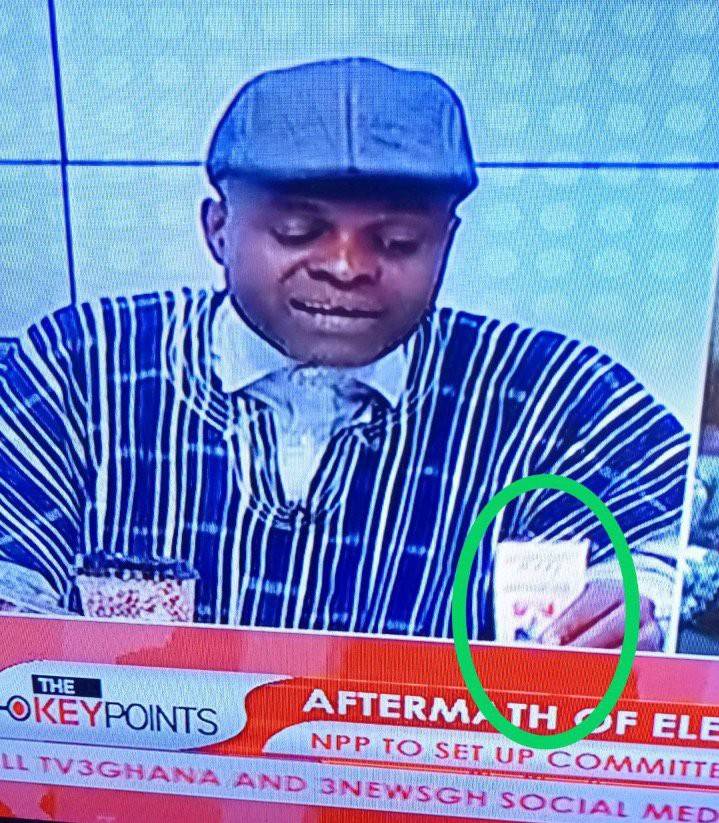Lawyer Martin Luther Kpebu recently caused a stir when he unveiled his 1998 New Patriotic Party (NPP) membership card during a live episode of Keypoints on TV3. His revelation has ignited heated discussions across social media, especially on X (formerly Twitter), where opinions remain divided. Some see this as proof of his long-standing political allegiance, while others doubt its significance or question his motives.
Influencer MPK joined the conversation with a post on X, saying, “Lawyer Martin Luther Kpebu pulls his 1998 NPP membership card on Keypoints show on TV3 confirming his political inclination; exposing critics.†This comment amplified the debate, drawing attention to Kpebu’s political alignment and whether it should matter in today’s context.
Many people online are expressing mixed feelings. A user questioned the importance of the card, suggesting it doesn’t automatically make Kpebu a loyal NPP supporter. “Many people hold multiple party cards for their own agenda. Just because Martin Kpebu shows a party card from 1998 doesn’t make him one of us,†the user argued. They further referenced other notable figures like Arthur Kennedy and Alan Kyerematen, who, despite their connections to the NPP, have not always been fully embraced by party loyalists.
Younger members of the NPP have also weighed in, airing frustrations about what it takes to prove loyalty within the party. One commenter expressed disappointment, saying, “For many young NPP men, you must agree to the evil and support the rot to prove you are a loyalist. It is shameful how some think.†This frustration highlights the moral struggles of younger party members, who feel torn between staying true to their values and supporting questionable practices in the name of loyalty.
Another individual raised the issue of dual political allegiances, stating, “We know for a fact that people hold membership cards for both main political parties. I have no doubt that Kpebu has an NDC membership card as well. He should be bold enough to show it.†This comment taps into a widespread belief in Ghanaian politics that some individuals hedge their bets by affiliating with multiple parties to protect their interests.
Criticism of the NPP’s ideals and history has also surfaced in these discussions. A user remarked, “Most people never knew the true ideals of the NPP were rooted in greed and tribalism. They mistook it for being aligned with the U.S. Republican Party. Manshia formed the NPP for tribal interests because they disagreed with using cocoa proceeds for national development.†These accusations challenge the narrative many Ghanaians have held about the party’s mission and values.
Amid the heated exchanges, some users have chosen to focus on broader issues beyond political affiliations. “He is a Ghanaian citizen before any political party,†one person wrote. “Being inclined to a political party doesn’t mean you have lost your sense of value, as some have shown us.†This sentiment reflects a desire for individuals to be judged on their personal integrity and contributions to society, rather than their party membership.
Concerns about ethnic representation within the NPP have also been brought into the spotlight. A commenter shared their personal experience, saying, “I changed my mind immediately I saw that all the executives of the TESCON leadership were from one ethnic group. It was a red flag for me. Apart from Bauliar, who is a northerner, no one from any tribe other than Asante holds a key position.†This perspective underscores long-standing grievances about the dominance of certain ethnic groups within the party’s leadership.
Martin Kpebu’s decision to reveal his NPP membership card has opened up a larger conversation about politics in Ghana. It is not just about one man’s political affiliation; it is about the underlying issues of loyalty, ethics, representation, and values that shape the country’s political landscape. Many Ghanaians are using this moment to reflect on what truly matters in politics—whether it’s the card you hold or the values you stand for.
This incident highlights how divided opinions remain when it comes to Ghana’s political system. While some believe that Kpebu’s membership card strengthens his credibility within the NPP, others see it as a distraction from more pressing national issues. As the debate continues, it serves as a reminder of the complexities of politics and the importance of staying true to one’s values in an ever-changing landscape.
In the end, Martin Kpebu’s revelation may not change much about how Ghanaians view political affiliations, but it has certainly sparked a conversation about what loyalty, leadership, and integrity mean in a modern democracy. This conversation, while heated, could pave the way for deeper reflections on the kind of political culture Ghanaians want to build for the future.




No comments yet
Be the first to share your thoughts!